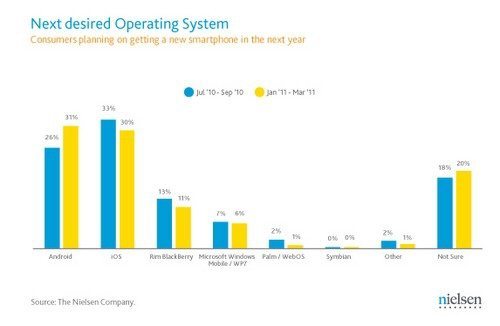iOS Losing Out To Android In Smartphone Desirability
If you are of the opinion that more people over in US prefer Apple’s iOS over Android you could be forgiven for believing so up until now that is, as apparently when it comes to smartphone desirability the Android platform is now ahead of iOS.
According to the guys over at the Boy Genius Report, the latest survey by Nielsen, back in June and September of 2010, when respondents were asked which smartphone platform they intend to purchase, 33 percent said iOS, 26 percent said Android while 13 percent said BlackBerry.
But now that platform desirability has changed slightly with Nielsen figures showing that when asked the same question between January and March this year Android pulled in 31 percent, while the iPhone garnered 30 percent and BlackBerry managed 11 percent.
Furthermore half of the people surveyed in March this year who said they had brought a smartphone in the last 6 months say they opted to go with Android, a quarter had purchased the iPhone and 15 percent had chosen a BlackBerry handset.
Sp if the figures are anything to go by it would appear that Android is more desirable than iOS albeit only slightly, agree or disagree?


Comments
2 thoughts on “iOS Losing Out To Android In Smartphone Desirability”
Bong!
No, the iOS *platform* is still far more desirable than the Android platform.
Nielsen's figures only compare half of the iOS platform – the iPhone – against almost the entirety of the Android platform and even then, Android only just squeaks past.
You have of course fallen into the trap of assuming that comparing the single iPhone against all the hundreds of phones (and tablets like the Dell Streak and Galaxy tab which all include cell phone hardware and 2 year cell phone contracts) from dozens of manufactures which are all grouped under the Android banner actually means something important.
However, as soon as you use the words "platform" or "operating system" to group devices, you need to ask why you are doing that?
The answer of course is to determine which platform represents the largest target for developers (app platform) or which platform is the largest web browsing audience or which platform represents the largest target for 3rd party hardware peripheral manufacturers, or which platform has the largest ecosystem etc
However as soon as you do that you of course need to include all devices in that platform running that OS to get a complete picture, otherwise you are not comparing the complete OS platform and what use is that to anyone but Android fans who want to be able to say Android beats iOS at something,
The reality is that iOS beats Android in just about all the useful metrics including app revenue (1,000% greater than Android), app downloads (82% v 5%), manufacturer revenue (51% vs 1% for Moto, 2% for Samsung, -1% for LG etc), Installed base (187 million vs ~110 million), app numbers, etc etc.
Including the iPod touch and iPad essentially doubles the size of the iOS platform while Android barely increases at all as just about all Android tablets are already included in Nielsen's numbers and shows why ComScore found that iOS is 59% larger than Android in the USA and 116% larger in Europe.
If you are only concerned with the smartphone market then "platform" means nothing and you need to compare Samsung, HTC, Moto etc all individually against Apple and RIM to get any sort of useful comparison.
-Mart
You do realize that this includes only Smartphone desirability, so tablets in no way influence, or should influence this statistic. This isn’t a question of how many people actually have a phone of a given platform, where iOS has had basically no ground for years, but of what platform people would rather have on a phone. People prefer phones running Android, that’s what the study shows, and no number of types of iPhones sold would change that, besides the fact that there are thinner phones with bigger and brighter screens, expandable/portable storage, almost 2x the processing power, 2x the RAM, NFC and 4G support, true multitasking, and they still exceed the iPhone in battery life for an equal or lower cost.